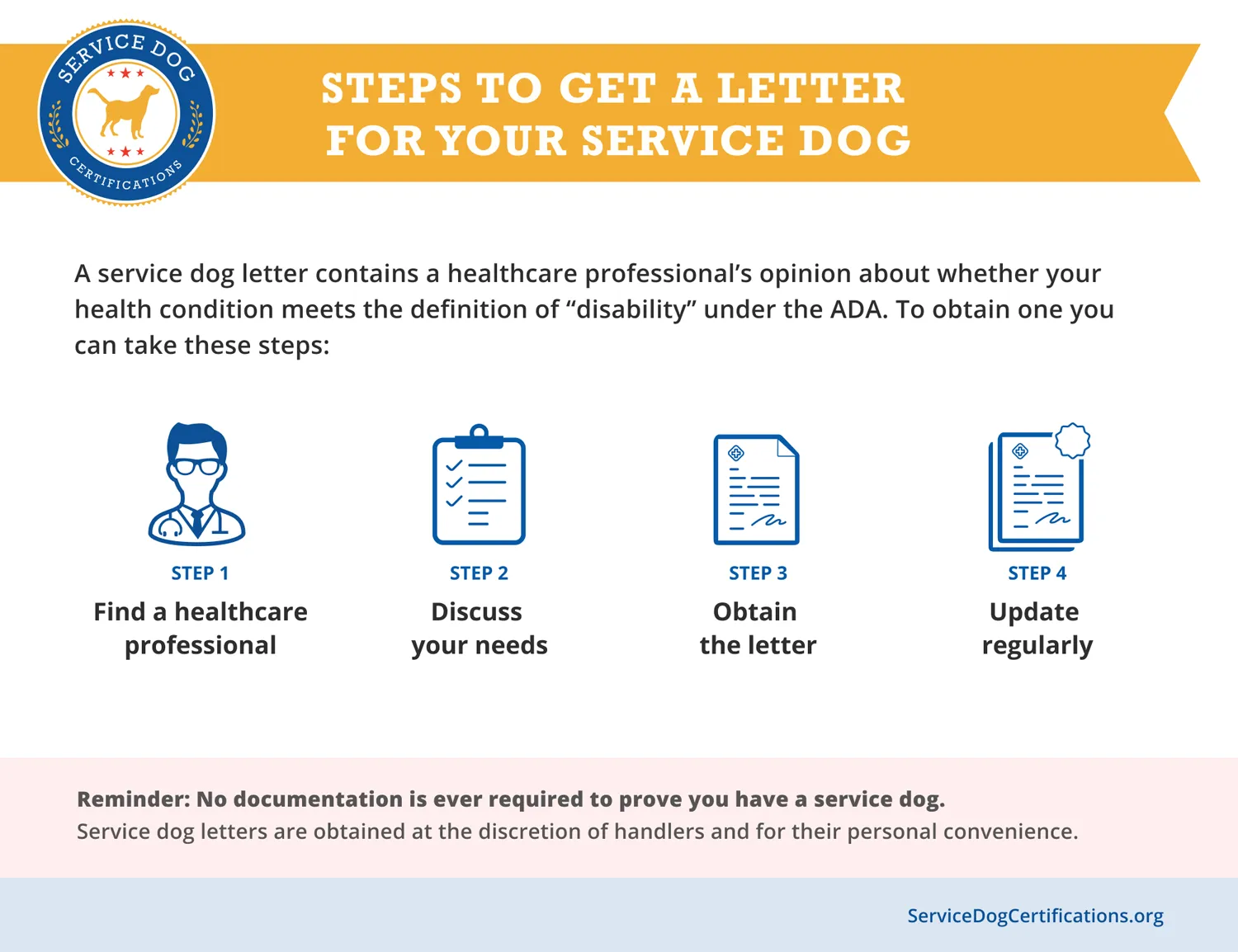How Do I Get A Service Letter For My Dog?

A service dog letter comes from a licensed health professional and confirms a service dog handler has an eligible condition. These letters are often obtained by handlers who need psychiatric service dogs, also known as PSD letters.
This guide will walk you through how to obtain a service dog letter and the reasons to consider one.
Steps to Get a Letter for Your Service Dog
If you’re interested in a service dog letter, your first resource should be your existing doctor or therapist. Inform them that you are requesting a signed letter that contains their opinion about whether your health condition meets the definition of “disability” under the ADA.
Here are some steps you can take to get a service dog letter:
- Find a healthcare professional
Seek out a licensed health professional who understands your needs and the role of service dogs.
- Discuss your needs
Discuss the role of your service dog and request a formal letter stating your need for the service dog.
- Obtain the letter
The letter should be written on the provider’s letterhead, indicating their professional details (such as licensing information) and confirming you have an ADA-eligible disability.
- Update regularly
Keep the letter current and renew it periodically. While there’s no set expiry for these letters, keeping them up-to-date is good practice.
Benefits of Having a Service Dog Letter
Although the Americans with Disabilities Act (ADA) confirms that service dog owners don’t need to carry any documentation to prove their dog’s status, obtaining a letter from a therapist can have certain advantages.
- Confirming eligibility: A service dog letter is primarily used to document proof that a person has an ADA-eligible condition. This is especially desirable for PSD owners who have invisible disabilities. There can be consequences for falsely misrepresenting yourself as eligible for a service dog, so many handlers want additional proof.
- Facilitating understanding: An official letter can speed up clarifying any misconceptions about your service dog’s role, even in situations where the ADA’s regulations apply.
- Enhancing personal comfort: Having an official letter can help answer questions about your service dog without needing to disclose additional personal health information.
- International usage: Some countries and foreign airlines require letters from a licensed healthcare provider as part of their assistance animal verification process.
- Protecting your rights: If your rights under the ADA are ever challenged, having an official letter can provide additional support.
Keep in mind that no third party can make having a service dog letter a condition for entry. Service dog letters are obtained at the discretion of handlers and for their personal convenience.
No documentation is ever required to prove you have a service dog, except for the DOT’s Service Animal Form when boarding flights.
About the Author: The writing team at Service Dog Certifications is made up of folks who really know their stuff when it comes to disability laws and assistance animals. Many of our writers and editors have service dogs themselves and share insights from their own experiences. All of us have a passion for disability rights and animals.
Latest Posts

Can you bring a service dog to a museum?
Yes, you can bring your service dog to the museum! All the major U.S. museums welcome guests with service animals in accordance with the Americans with Disabilities Act (ADA). There are some areas, however, that might be off-limits. Here’s what you should know if you plan to spend a day at the museum with your […]

Read More

How to Bring a Service Dog to Six Flags Magic Mountain
Service dogs are welcome at Six Flags Magic Mountain so long as they are, according to Six Flags, “trained to do work or perform tasks for people with disabilities.” Of course, your dog must be housebroken and remain on a leash or harness and under your control while at the park — and the park […]

Read More

When Stores Can Refuse Your Service Dog
According to the Americans with Disabilities Act (ADA), service dogs should be allowed into any store most of the time. A store owner can legally exclude a service dog if they are actively growling, snapping at, or frightening customers, or if the dog is obviously out of the control of its owner. Ordinary behaviors — […]

Read More

